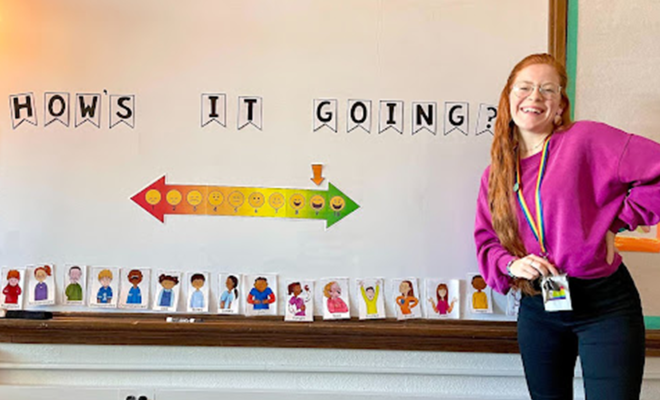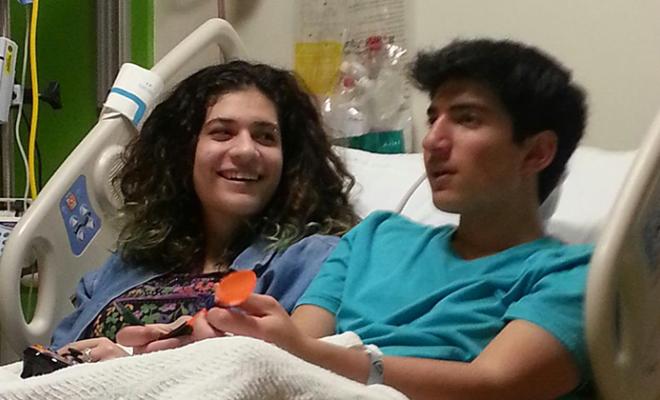The World is Crumbling: A Peek into the Mind of a Teen
It was the spring of 2008 when my world flipped upside down. I was 13 years old and just finishing up the 8th grade. I felt like a relatively “normal” kid, despite being diagnosed with cystic fibrosis at 6 weeks old. I went to sleepovers, enjoyed school, ran around my neighborhood with friends, and mostly only cared about whoever I had a crush on at the time. Ah … to be young!
My health had never really been a problem. Sure, I had CF, but I was lucky to have mild enough symptoms that I really only worried about tummy aches, taking enzymes, and seeing how many friends would come join me and my team at the Great Strides walk each year. That is, until my quarterly check-up in February 2008.
My lung function had fallen shockingly low in just three months since my last check-up and my doctor was concerned about a possible lung infection. I still remember the moment he told me I would need to come to the hospital for a “tune-up.” I didn’t understand. The concept was foreign to me. A tune-up was always something I heard about from others with CF, but didn’t need to worry about for myself. It couldn’t be true — I remember the feeling of numbness that went through my body as the weight of this new reality fell upon my shoulders.
I was not invincible. I was sick and I would always have to worry about being sick. It felt like my entire world view was shifting under my feet, crumbing every understanding I had of my world and my future all at once.
Flash forward to fall 2023 and I am healthy and thriving at 29 years old. It turns out, my 13-year-old brain was wrong, and a tune-up was not, in fact, the end of the world. But I share this story with you in order to bring us all back to the mind of a child or teen. Shifts that adults may think are small may feel like the world crumbling to teens. It’s important to remember this perspective as we support the young people in our lives each day.
What is School Counseling, Anyway?
Fall marks the beginning of a new school year, and as students across the country return to school routines, schedules, and learning, I think it’s important that we discuss what support exists for students who are living each day with chronic illness. How we support these students in school matters, and it’s a big part of why I pursued a career in mental health and why I am proud to be a professional school counselor.
I never imagined I would become a school counselor. In fact, the job didn’t even exist in the same way when I was in school. Over time, the profession has transformed from “guidance counselors,” who supported students mostly with post-secondary planning to “school counselors,” who now support students in a wider range of areas, like academic success, career exploration, and social-emotional needs regarding school. Now, we see counselors across all education levels, instead of just high school, actively teaching coping skills in classrooms, supporting the mental and emotional needs of students (basic needs must be met before anyone can learn!), and normalizing mental health in school communities.
So, with the fresh crisp to the air and the wind of a new school year at our backs, I feel honored and grateful to share some of my top tips for a positive and proactive school year. My hope is that these tips will offer students with CF and their families the action-items and inspiration they need to make this their best school year yet!
School Counselor Tips for a Positive and Proactive School Year
- Maintain Open Communication
My first tip is a big one: maintain open communication with your child’s school. Proactive steps are key here. At the beginning of each year, it is a good idea to set up a meeting with those at school who work closely with your student. Discuss medications with the nurse, 504 plans with the counselor or social worker, daily routines with teachers — and it doesn’t hurt to loop the administration in on the conversation, too. The more support a student has from different departments at school, the more likely they are to feel supported, validated, and successful.
- Practice Self-Advocacy
If there’s one thing I want my students to remember after working with them, it is that they are their own best advocate. Self-advocacy is a skill that takes practice, courage, and communication. Self-advocacy at its core is a person’s ability to effectively communicate, negotiate, or assert their own interests, desires, needs, and rights. When I think about students with chronic illness, disabilities, and mental health challenges, I want to underline the importance of self-advocacy.
A school can’t know how to best support a student with different needs until you tell them what your student needs. This goes for administration, nurses, counselors, social workers, teachers, and other support staff. Being willing to have conversations about your needs at school takes courage, but the more your student practices this skill, the easier it will become.
- Follow Attendance Policies
Schools are held accountable by states through attendance policies to ensure that students are accessing education. Most schools have an attendance team or clerk who is in charge of running reports and letting counties know if students have unexcused absences. This is why it is SO important that you understand and follow the school’s attendance policies for your student with CF.
CF requires maintenance in the form of appointments, tune-ups, surgeries, and more. This often means missing school for at least a few days each year. If you know your student is going to be absent, make sure to call the school and report it so it’s marked as an excused absence. And, to the best of your ability, try to keep your student’s missed days to a minimum. Student academic and career success is directly correlated to number of absent days each year.
- Know Your Team
Just like the care team at your clinic, school teams are full of people ready and available to support you and your student.
- Social workers can connect you to community resources and support.
- Family liaisons can help you get involved and feel connected to your school community.
- School nurses can help students manage required medication and support them to live the most “normal” school day possible.
- School counselors can help students process big emotions, navigate social relationships, and feel successful in school.
Lean on your team and encourage your student to ask for help when they need it.
- Care for Both Body and Mind
In recent years, I’ve felt encouraged to see mental and emotional health conversations popping up more and more in the CF community. I was lucky enough to co-chair the virtual conference, BreatheCon, in 2021, where we largely focused on mental health and how living with CF affects it.
Living with chronic illness and navigating sickness and changes comes with many mental and emotional health effects. It is important we teach students how to manage big emotions, practice coping skills, and regularly employ self-care strategies. These are things that can be learned. I’m always amazed by children who have been taught this from a young age. Here are some ideas that come to mind: Try meditating as a family, get outside for walks in nature, take extra time to savor your breakfast or dinner together, connect with your community, and, importantly, develop a gratitude practice.
- Choose What and How You Share About CF
This tip is particularly important for students going into middle and high school. I encourage families to have conversations about how much a student wants others at school to know about their CF. Some students love to share, advocate, get friends involved, and feel embraced by their school community. Others prefer a more private approach and don’t want people to know much, or anything at all, about their disease. Let’s encourage students to think about this and come to their own conclusion … and then respect what they choose. It is okay to be private and it is okay to be open. Our job is to support these students as they discover themselves and who they want to be.
In Conclusion
From the bottom of my heart, I thank you for taking the time to learn about school counseling, your school community, and how you can best support your student this school year. Proactivity goes a long way and often leads to the best results. Navigating school-aged years with CF can feel challenging at times, but you are not alone. If you have any questions, comments, wonderings or just want to chat, please feel free to reach out to me or the plethora of supports available through the Cystic Fibrosis Foundation. This community is a beautiful thing, and I am so incredibly grateful to be a part of it.
Gratefully,
Sarina Sandstrom Lynn
Interested in sharing your story? The CF Community Blog wants to hear from you.





